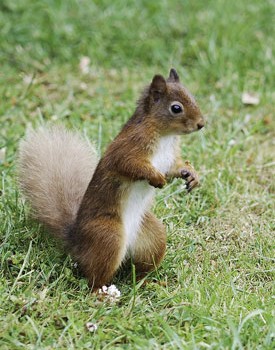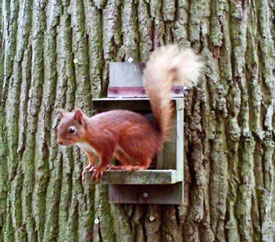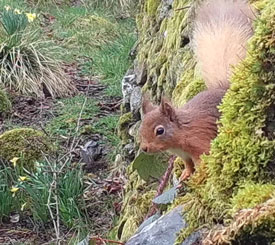 Figures published earlier this year show that in strategically systematic and coordinated programmes carried out in the north of England, grey squirrel control is most effective when a combination of trapping and shooting is used, with shooting proving to be the most effective aspect of control. Read more>>
Figures published earlier this year show that in strategically systematic and coordinated programmes carried out in the north of England, grey squirrel control is most effective when a combination of trapping and shooting is used, with shooting proving to be the most effective aspect of control. Read more>>
Author: Steph McIvor
Westmorland Red Squirrels E-News – April 2017
 Welcome to our first E-News. Our plan is to issue it every couple of months with the exception of February each year when we’ll produce an Annual Review. What do you think of this new way of keeping in touch? Please let us know. Read more>>
Welcome to our first E-News. Our plan is to issue it every couple of months with the exception of February each year when we’ll produce an Annual Review. What do you think of this new way of keeping in touch? Please let us know. Read more>>
Grey squirrels are bad for the British countryside – full stop
A very interesting article making the case for grey control, written by Dr Craig Shuttleworth and published in The Conversation. Read the full article here>>
The Conversation UK is a not-for-profit, registered charity, sharing knowledge from the world’s best universities with a diverse, global audience of readers
Mid Wales Red Squirrel Partnership Red Squirrel News- Spring 2017
 It’s been quite a while since the last issue of Red Squirrel News. Staff attention has been focused on the coordination of a management plan for the Mid Wales Red Squirrel Focal Site. There was no winter issue of Red Squirrel News this year, but that means there’s plenty of things red-squirrelly to cover in this spring issue!
It’s been quite a while since the last issue of Red Squirrel News. Staff attention has been focused on the coordination of a management plan for the Mid Wales Red Squirrel Focal Site. There was no winter issue of Red Squirrel News this year, but that means there’s plenty of things red-squirrelly to cover in this spring issue!
Find out how the MWRSP is working with the forest industry in the Tywi area to help to retain and restore habitat for the benefit of red squirrels. Discover where some of the pine martens brought to Wales from Scotland by the Vincent Wildlife Trust have established territories. Find out about the new Red Squirrels United Project and how it is working to save red squirrels across the UK. Learn about new red squirrel sightings near to Llanddewi Brefi, in the west of the Focal Site, and how this might be an indication of the growing health of this key population. Read the latest info from the British Association for Shooting and Conservation (BASC) on their Trap Loan Scheme and how they are working with MWRSP to create a ‘buffer to the buffer’ for the Red Squirrel Focal Site, enabling further protection for our red squirrels from grey squirrels. Read more>>
Morpeth & District Red Squirrels – Spring 2017
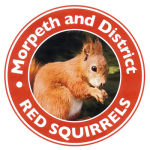 In 2015, the MADRS grey control team removed over 1100 greys from our patch and another 720 were removed in 2016. If a third of these were female and you think about each having 2 breeds with 3-4 young per season….well, it makes for a heck of a lot of greys damaging trees, predating on bird eggs and fledgelings and obviously spreading the killer squirrel pox virus to our native reds. As always, it is this essential work that is the greatest contributing factor to helping to safeguard our endangered native reds. We keep stressing that this is not a side of red conservation that is taken lightly. It is the necessary to ensure the survival of the reds. There is much talk of a grey squirrel infertility drug being researched but the fact is this is going to be a great many years away. Until that time, the concerted effort of our grey control team and everyone who reports sightings and people who monitor a trap in their garden, is the only saviour for the red squirrel. Read more>>
In 2015, the MADRS grey control team removed over 1100 greys from our patch and another 720 were removed in 2016. If a third of these were female and you think about each having 2 breeds with 3-4 young per season….well, it makes for a heck of a lot of greys damaging trees, predating on bird eggs and fledgelings and obviously spreading the killer squirrel pox virus to our native reds. As always, it is this essential work that is the greatest contributing factor to helping to safeguard our endangered native reds. We keep stressing that this is not a side of red conservation that is taken lightly. It is the necessary to ensure the survival of the reds. There is much talk of a grey squirrel infertility drug being researched but the fact is this is going to be a great many years away. Until that time, the concerted effort of our grey control team and everyone who reports sightings and people who monitor a trap in their garden, is the only saviour for the red squirrel. Read more>>
Westmorland Red Squirrels – Spring 2017
 If you’re new to red squirrels, all the various organisations involved in red squirrel conservation must seem baffling – even those of us who’ve been involved for many years find it hard to keep up with developments. The UK Squirrel Accord is the most recent organisation at the national, policy-making level and we’re pleased to report here that the voluntary groups are in the process of gaining recognition in that forum. Regionally, the Red Squirrels Northern England (RSNE) project will still be processing our cull and sightings data and continuing their monitoring programme, but their capacity to provide practical conservation help is now very much reduced owing to a lack of funding. Red Squirrels United is the new UK-wide red squirrel project that you might hear about in the media, but unfortunately for us the project doesn’t specifically include Cumbria. It’s therefore more important than ever for us to work closely with our fellow voluntary groups through our membership of Northern Red Squirrels Cumbria in order to keep Cumbria’s red squirrels high on the conservation agenda and in the public eye. Read more>>
If you’re new to red squirrels, all the various organisations involved in red squirrel conservation must seem baffling – even those of us who’ve been involved for many years find it hard to keep up with developments. The UK Squirrel Accord is the most recent organisation at the national, policy-making level and we’re pleased to report here that the voluntary groups are in the process of gaining recognition in that forum. Regionally, the Red Squirrels Northern England (RSNE) project will still be processing our cull and sightings data and continuing their monitoring programme, but their capacity to provide practical conservation help is now very much reduced owing to a lack of funding. Red Squirrels United is the new UK-wide red squirrel project that you might hear about in the media, but unfortunately for us the project doesn’t specifically include Cumbria. It’s therefore more important than ever for us to work closely with our fellow voluntary groups through our membership of Northern Red Squirrels Cumbria in order to keep Cumbria’s red squirrels high on the conservation agenda and in the public eye. Read more>>
Non-lethal ways of reducing invasive grey squirrel populations
Work is being stepped up to develop an oral contraceptive specifically for controlling grey squirrels, which are such a threat to our red squirrels. A report in The Independent summarises the next phase of work by the Government’s Animal and Plant Health Agency to develop the vaccine and design grey-only traps. More details here: http://www.independent.co.uk/environment/prince-charles-squirrels-nutella-sterilise-plans-backs-grey-red-a7597481.html . The same story is covered in The Times: http://www.thetimes.co.uk/article/prince-of-wales-backs-mass-sterilisation-of-grey-squirrels-ncgstkh28?shareToken=c3be20f11407765b02ac3e18fed007f3
Your Red Squirrels Need You!
Northern Red Squirrels welcomes the recent call for a national army of volunteers to save our red squirrels. More details here: http://www.wildlifetrusts.org/news/2017/02/24/vital-volunteers-needed-save-our-last-red-squirrel
If you are interested in becoming a volunteer for Northern Red Squirrels, check the NRS Groups section above to see if there is a group near you.
P&DRSG – Winter Newsletter 2016
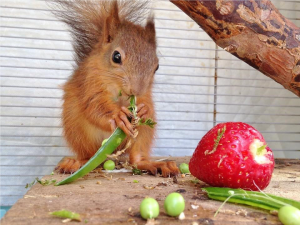
Maybelle is free again
It gives us great pleasure to anounce the safe release of Maybelle the red squirrel back into the wilds of Haweswater. Maybelle was rescued by Jerry & Sarah back in May after she was found wandering in the grounds of Haweswater Hotel. After plenty of TLC, the tiny red squirrel kitten was strong enough to fend for herself and quickly learned how to use a squirrel feeder and enjoyed cosy nights in her own nesting box. Read more>>
Morpeth & District Red Squirrels – Winter 2016
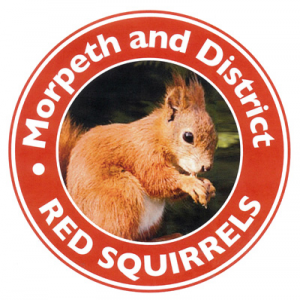 By the end of October the MADRS grey control team had passed the 600 mark of grey squirrels removed from our patch. It is this essential work that is the greatest contributing factor to helping to safeguard our endangered native reds. However, without the support of the public who report sightings and also from private households who monitor traps in their gardens, we would not be able to achieve these results. As always it is the ‘many a mickle meks a muckle’ approach that collectively produces these outstanding results. (‘Many a small makes a big’ for those who are struggling with my grannies old saying). Read more>>
By the end of October the MADRS grey control team had passed the 600 mark of grey squirrels removed from our patch. It is this essential work that is the greatest contributing factor to helping to safeguard our endangered native reds. However, without the support of the public who report sightings and also from private households who monitor traps in their gardens, we would not be able to achieve these results. As always it is the ‘many a mickle meks a muckle’ approach that collectively produces these outstanding results. (‘Many a small makes a big’ for those who are struggling with my grannies old saying). Read more>>


